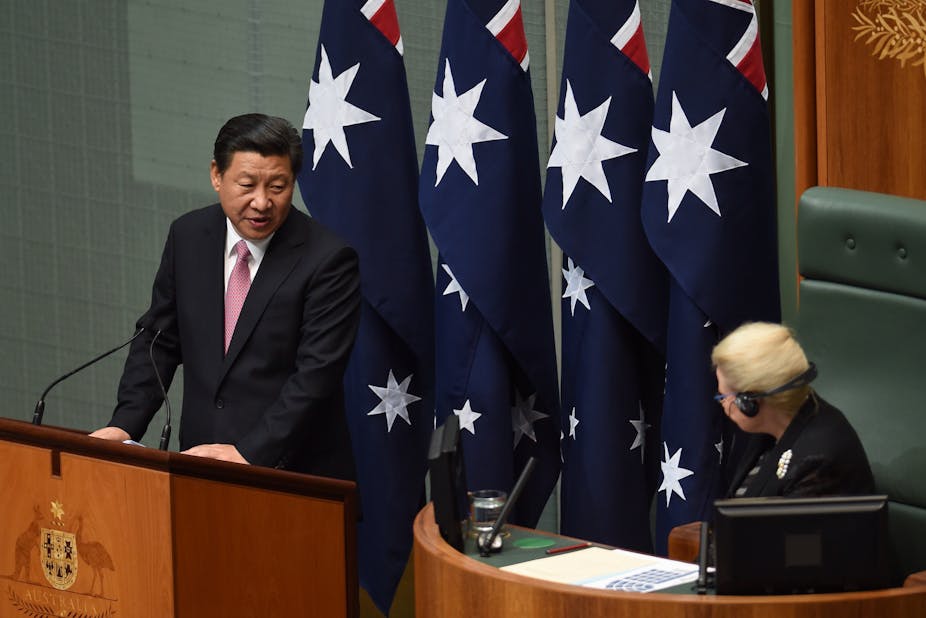Chinese President Xi Jinping has declared that “big guy” China is dedicated to pursuing peace and prosperity in the Asia-Pacific region in a speech urging that China and Australia “jointly meet various security challenges to our region”.
Addressing federal parliament, Xi said Australia and China should be “harmonious neighbours who stick together through good and bad”.
On the day the two countries concluded a free trade agreement a decade in the making, Xi said they had elevated bilateral relations into a “comprehensive strategic partnership”.
Australian sources said this was China’s language to describe closer relations than previously existed. Under Julia Gillard the relationship was lifted to a “strategic partnership”, which came with architecture for regular high-level dialogue.
Xi used his address to send a strong message about China’s peaceful intentions, although there was the caveat that “the Chinese people will firmly uphold the core interests of China’s sovereignty, security and territorial integrity”.
Australian National University’s professor of strategic studies, Hugh White,said what stood out was how positive Xi was determined to be.
White contrasted Xi’s speech with the weekend address by US President Barack Obama. Obama had given “a dark view” of the region’s future, White said.
“He talked about the stark choice between a bright future and a dark future and very clearly identified China with that dark future. Xi painted a very bright picture – big economic opportunities and no reason to feel any anxieties about what China’s growing power would mean for Australia and the region.”
Xi said many people around the world were asking what would China – a state “committed to socialism with Chinese features” – be like when it grew in strength.
“Many people applaud China’s achievements and have great confidence in China. Some others have concerns about China, and also there are people who find fault with everything China does.
"But these diverse views are to be expected. After all, China is a large country of more than 1.3 billion people. It is like the big man in the crowd. Others will naturally wonder how the big guy will move and act and be concerned that the big guy may push them around, stand in their way or even take up their place.”
China remained committed to pursuing peaceful development “and we sincerely hope that all other countries will do the same”, Xi said.
“A harmonious and stable domestic environment and a peaceful international environment are what China needs most,” he said. “A warlike state will eventually fall … China is dedicated to upholding peace.
"China is an Asia-Pacific country. Without peace and prosperity in the Asia-Pacific, stability and development in China cannot be ensured.”
China promoted mutual benefit and inclusiveness and advocated a new vision of Asian security. It aimed to create “a virtuous cycle of development and security in the Asia-Pacific”.
China was ready to enhance dialogue and co-operation with relevant countries “to maintain freedom of navigation and the safety of maritime routes and ensure a maritime border of peace, tranquillity and co-operation”.
Xi said it was China’s long-standing position to address peacefully its disputes with other countries over territorial and maritime interests through dialogue and consultation.
“China has settled land boundary issues with 12 out of its 14 neighbours through friendly consultation. And we will continue to work in this direction.”
Xi said China and Australia should increase dialogue; they should work together to sustain peace, stability and prosperity in the Asia-Pacific.
This required a number of steps, Xi said.
“We should increase mutual understanding and be sincere and trustworthy partners,” he said.
“Both China and Australia are important countries in the Asia-Pacific. We are not burdened by historical problems between us, nor do we have any conflict of fundamental interests.
"We are both committed to peace and co-operation. We both endeavour to uphold and ensure stability and prosperity. We have every reason to go beyond a commercial partnership, to become strategic partners who have shared vision and pursue common goals.”
The two countries differed in history, culture, social systems and stages of development, “so it’s natural for us to disagree on some issues”. What was important was to talk candidly, seek common ground despite differences, and meet each other halfway.
They should ensure development reinforced each other. The FTA would create better institutional arrangements for economic co-operation, boosting traditional cooperation in such priority areas as energy and resources and accelerating the growth of new areas of co-operation such as infrastructure, agriculture and animal husbandry to further diversify business ties.
China supported Australia’s plan to develop its northern region and it welcomed Australian companies actively participating in the development of China’s western region. The countries should increase two-way investment.
China and Australia should intensify people-to-people exchanges “and be friends who open hearts to each other.
"If a tree is to be forever lush and exuberant, its roots must be struck deep in the soil; likewise, if the Chinese-Australian relationship is to flourish, it should be supported by stronger people-to-people ties.”
The two nations should encourage regional countries “to increase co-ordination of economic policies, speed up infrastructure connectivity, upgrade monetary and financial co-operation, promote trade liberalisation and expand people-to-people exchanges”, Xi said.
“Our two countries should co-operate in disaster relief, counter-terrorism, maritime safety, and jointly meet various security challenges to our region.”
Despite last week’s US-China deal on post-2020 emissions, Xi did not mention climate change in his speech.
Xi is one of three leaders to address parliament while in Australia for the G20. Britain’s David Cameron spoke on Friday; Indian Prime Minister Narendra Modi speaks tomorrow. Xi is the second Chinese president to address the Australian parliament – Hu Jintao did so in October 2003.

